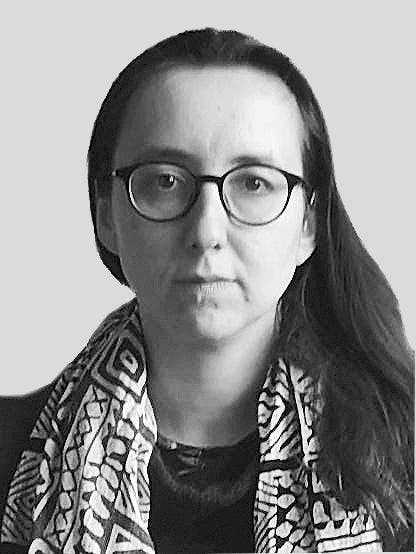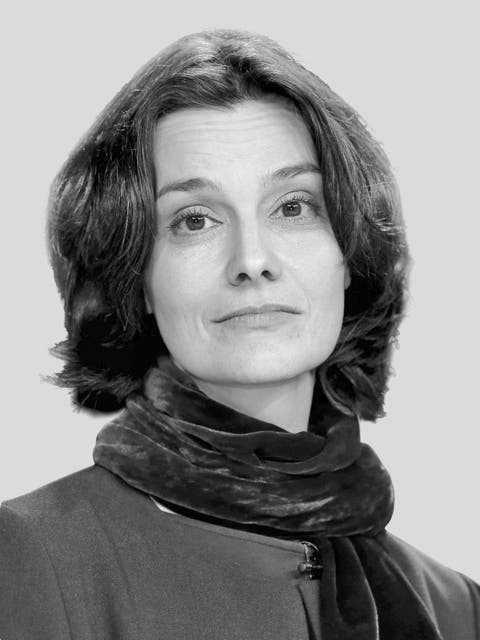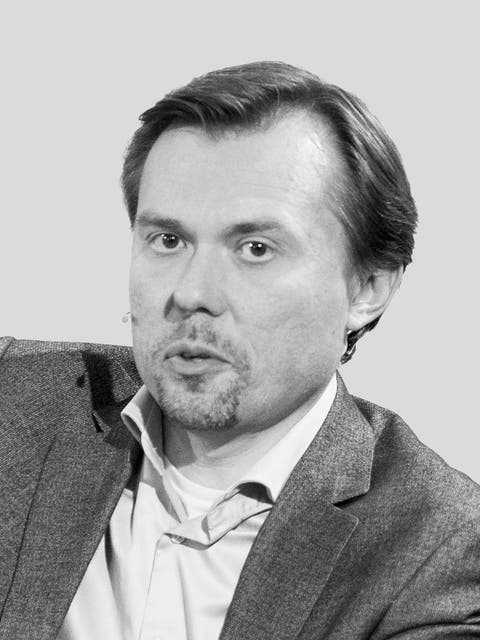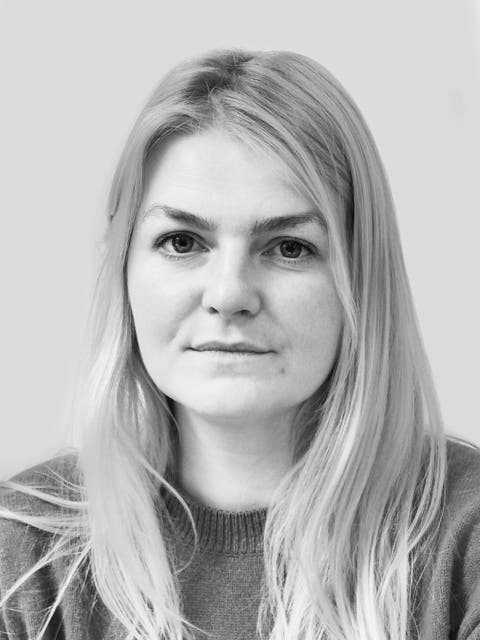For a long time, the Ukraine was an intermediate kingdom for many Germans, and they thought primarily of Chernobyl. The lack of understanding shown to their country contributed to the war, complain Ukrainians who have lived in Berlin for years.
Many Ukrainians in Berlin are now faced with the challenge of getting involved in life in Germany without losing the prospect of returning: refugees in the arrival center on the site of the former Tegel Airport.
Oleksandra Bienert, 38, historian and activist
Not far from Berlin’s Ostbahnhof is the headquarters of the Rosa Luxemburg Foundation, which is close to the German Left Party. “Down with your arms!” says a banner hanging on the facade, and next to it, in many languages: “Peace”. Oleksandra Bienert, whom I meet a few meters away in a former factory building where Ukrainian activists have now taken up residence, is annoyed by such simple slogans: “We’re not laying down our arms,” she says. “After all, it’s about our existence.”
For the Ukrainian, who has lived in Berlin since 2005, German pacifism and peace kitsch are sometimes difficult to bear: at the beginning of April there was a “peace concert” at the International Lomonossow School in the East Berlin district of Marzahn. “In the invitation, however, it was not clearly stated that we were dealing with a Russian war of aggression,” reports Bienert. A large majority of Russians support Putin’s campaign.

Oleksandra Bienert
Just as foreign to the Ukrainian as German pacifism is the post-national attitude of many Germans. You have to be able to afford one, Bienert hints: “If you’re a member of the EU, in which the rule of law applies, it’s easier to stand up for a world without borders.”
Bienert is bothered by the fact that many Germans consider Russians and Ukrainians to be brother nations. “We have a much longer common history with Poland and Lithuania,” she explains. If a panel on Ukrainian affairs is held in Berlin, a Ukrainian, a Russian and sometimes a Belarusian are invited. “I think the Russians have talked for us long enough, now they should let us speak.” In the meantime, Russian NGO representatives also understand this.
Russians and Germans have an idea, an idea, an image of each other. Ukraine, on the other hand, is all too often overlooked. Only recently, the daily newspaper “Die Welt” hired a Russian columnist who, although she attracted attention with a protest against the war, had previously been spreading propaganda in the Russian state media for years. “It’s a shame for the German media that they were hired to report on the war in Ukraine. There are enough talented journalists who can do this job,” says Bienert.
She finds Germany’s behavior towards Ukraine contradictory: “Now tens of thousands are demonstrating, but where were these people in 2014 when some Crimean Tatars had their eyes gouged out after the annexation of Crimea?” For years she had to argue with some Germans about whether Ukrainian was an independent language. “But now they donate a lot of money and take in a lot of people.” She was overwhelmed by this solidarity. But she thinks one thing is a pity: “For years, the Germans put little pressure on their politicians, but now they are paying for their mistakes.”
Katya Petrovskaya, 52, writer

She was born in Kyiv, Russian is her mother tongue, but Katja Petrowskaja writes her books in German. Sometimes she says “we” when she means the Germans, even though she still only has a Ukrainian passport. The writer has lived in Berlin since 1999.
In Germany, Ukraine was often associated with the Holocaust, she reports. The Germans would also have thought of the Chernobyl reactor accident and its consequences and later perhaps of the Holodomor, the great famine of the 1930s. The Ukraine has always been perceived as a scene of catastrophes, hardly ever as a subject with its own history.
“When the Orange Revolution began in 2004, I understood even better how little was reported about and from Ukraine.” The shutdown of the Chernobyl nuclear power plant in 2000 was the point at which almost all foreign correspondents left Kyiv. “They sat in Warsaw and Moscow for decades. It was like so often: you looked at the country from the east and from the west.”
Being Ukrainian only became important to Petrovskaya over time: “I only lived in an independent Ukraine for a few years. For me it was important to be from Kyiv, but not to have a specific national identity. I have many.”
But crises are also identity-forming. “The Maidan is the topography of my childhood.” During the 2014 revolution, around a hundred people died on the street where she grew up. “I was also glad that Ukraine was no longer at war in Chechnya and thus no longer part of the empire that slaughtered people,” she says. “Actually, I now consider it lucky that I’m Ukrainian.”
Today, Petrovskaya appears from time to time on German talk shows as an explainer of Ukraine. “Sometimes I ask myself why I am invited there. Just because I’m from Kyiv? But I don’t want to leave the stage to those who understand Putin either.” The Germans still looked at Ukraine with an imperial gaze. An example of this is the philosopher Richard David Precht, who said that the Ukrainians also have a duty to see when they have to capitulate. «A call to slavery. Embarrassing,” says Petrovskaya.
The first speeches by German politicians after the so-called turning point were impressive. «But then the time of delays, excuses and half measures soon began again. And this attitude could now prevail.” The Ukrainians also fought for the freedom of the Germans. “What is democracy anyway if you depend on a criminal regime for your energy supply?”
Germany’s behavior is contradictory. “Some help day and night and look for solutions.” But others are already considering lifting the sanctions against Russia. “I don’t envy the German politicians. It’s difficult now to have to correct everything that has been done wrong over the past twenty years.” However, she would like Federal President Steinmeier to give a speech about his mistakes and for former Chancellor Angela Merkel to speak up. «Or a ‹mea culpa› by Gerhard Schröder. Where are all these people who have made big deals while people are dying for their oil and gas?”
In her story “Maybe Esther” (2014), Petrovskaya deals with the murder of the Jews of Kiev. Now, she believes, is the time when the Germans must assume their historical responsibility towards Ukraine. She had also been attacked by German pacifists. «For them I am the warmonger, not Vladimir Putin. This pacifism is a crime.”
Andrii Portnov, 42, historian

Andrii Portnov
Andrii Portnov’s friendliness and willingness to help leave one almost a little ashamed: Although the historian, who teaches as a professor of Ukrainian history in Frankfurt an der Oder, may be in demand these days, he insists that we meet where it is suits me best. At the end of our conversation in a café in west Berlin, he thanks him profusely, as if, as a Ukrainian in Germany, one should still be happy to be heard at all.
In a way, this still applies: “I would be happy to hear from Frank-Walter Steinmeier or one of his employees,” says Portnov. The same applies to other politicians. “In Germany I hold the only professorship for Ukrainian history, and I would be easy to find.” Not that Portnov wants to wash the caps of German politicians, as his friend, the Ukrainian ambassador Andri Melnik, repeatedly does. “But I do have suggestions as to what we could do to create more knowledge about Ukraine.”
In Germany there is a lack of knowledge about his home country: “Many Germans only see Russia as a Nazi victim,” explains Portnov. “The entire Ukraine was occupied twice by the Germans: in 1918 and 1941. You can also derive historical responsibility from this – if you want to.” Much of what the Ukrainians are now doing to defend themselves is reduced to nationalism in Germany, Portnov complains. “Even now I still see the same stereotypes.”
However, he was pleasantly surprised by the willingness to help the Germans showed the Ukrainian refugees. “But I ask myself every day whether it will stay that way.” At some point there always comes a time when people begin to understand that this was the case in every refugee crisis. Portnov hopes that the goodwill will last at least a few years. Nobody knows how long the war will last.

Nataliya Pryhornytska
Nataliya Pryhornytska, 34, political scientist and activist
“If I include my voluntary work, I currently work eighty hours a week,” says Nataliya Pryhornytska. “I feel a sense of powerlessness, but you always have to keep going, even if you have no strength left.” The political scientist, who has been living in Germany for eighteen years, is currently mainly busy organizing the transport of relief supplies and collecting donations.
She doesn’t believe that the Germans really understood how great the danger was before the war broke out. “You always try to calculate everything here. Why is the gas embargo taking so long when the plans for it have been on the table since October? As early as January, 200,000 Russian troops were at the border.”
We are in a café in the Prenzlauer Berg district; once Pryhornytska has to interrupt the conversation to take a call from Kyiv. She also works with Ukrainian organizations that are looking at possible reforms in her home country, she explains. “Some employees are now in Warsaw, some are still in Kyiv. When we’re on the phone, they’re sometimes in the bunker or in the basement. But the work doesn’t stop. We have to think about the time after the war now.”
Many Ukrainians are disappointed in Germany. “Sometimes I have to justify myself to the Germans. I often don’t know what to answer. If I wanted to be cynical, I would say that German understanding of Ukraine grows with fear: suddenly people understand us because the threat is getting closer to them.” But she also believes that German society is more mature than politics: “I keep hearing that many would be willing to give up some prosperity and comfort if they could help with it.”
Five weeks ago, Pryhornytska was in Kyiv to bring her 35-year-old sister and their eight- and three-year-old children to Berlin. «Your children are now attending Ukrainian online classes as long as we are looking for a school for them. We should give people time to integrate, now they are still traumatized.” Many Ukrainians in Berlin are now faced with the challenge of getting involved in life in Germany without losing the prospect of returning. “I know people who are already returning to the liberated areas, even if that’s not exactly sensible,” says Pryhornytska. “But they’re clutching at straws.”
